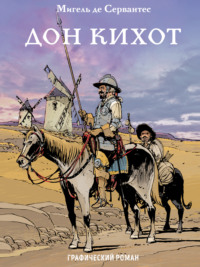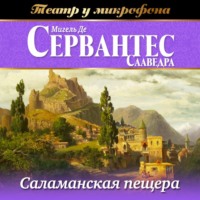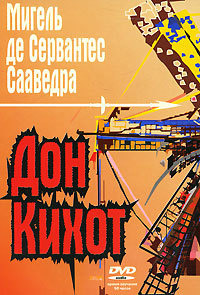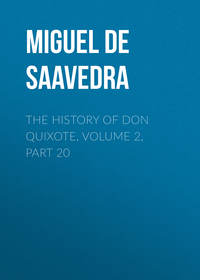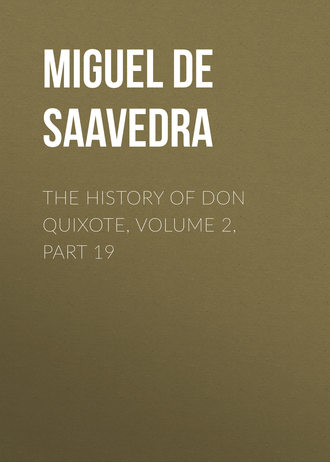 полная версия
полная версияThe History of Don Quixote, Volume 2, Part 19
"Why, you idiot and wife for Barabbas," said Sancho, "what do you mean by trying, without why or wherefore, to keep me from marrying my daughter to one who will give me grandchildren that will be called 'your lordship'? Look ye, Teresa, I have always heard my elders say that he who does not know how to take advantage of luck when it comes to him, has no right to complain if it gives him the go-by; and now that it is knocking at our door, it will not do to shut it out; let us go with the favouring breeze that blows upon us."
It is this sort of talk, and what Sancho says lower down, that made the translator of the history say he considered this chapter apocryphal.
"Don't you see, you animal," continued Sancho, "that it will be well for me to drop into some profitable government that will lift us out of the mire, and marry Mari-Sancha to whom I like; and you yourself will find yourself called 'Dona Teresa Panza,' and sitting in church on a fine carpet and cushions and draperies, in spite and in defiance of all the born ladies of the town? No, stay as you are, growing neither greater nor less, like a tapestry figure – Let us say no more about it, for Sanchica shall be a countess, say what you will."
"Are you sure of all you say, husband?" replied Teresa. "Well, for all that, I am afraid this rank of countess for my daughter will be her ruin. You do as you like, make a duchess or a princess of her, but I can tell you it will not be with my will and consent. I was always a lover of equality, brother, and I can't bear to see people give themselves airs without any right. They called me Teresa at my baptism, a plain, simple name, without any additions or tags or fringes of Dons or Donas; Cascajo was my father's name, and as I am your wife, I am called Teresa Panza, though by right I ought to be called Teresa Cascajo; but 'kings go where laws like,' and I am content with this name without having the 'Don' put on top of it to make it so heavy that I cannot carry it; and I don't want to make people talk about me when they see me go dressed like a countess or governor's wife; for they will say at once, 'See what airs the slut gives herself! Only yesterday she was always spinning flax, and used to go to mass with the tail of her petticoat over her head instead of a mantle, and there she goes to-day in a hooped gown with her broaches and airs, as if we didn't know her!' If God keeps me in my seven senses, or five, or whatever number I have, I am not going to bring myself to such a pass; go you, brother, and be a government or an island man, and swagger as much as you like; for by the soul of my mother, neither my daughter nor I are going to stir a step from our village; a respectable woman should have a broken leg and keep at home; and to be busy at something is a virtuous damsel's holiday; be off to your adventures along with your Don Quixote, and leave us to our misadventures, for God will mend them for us according as we deserve it. I don't know, I'm sure, who fixed the 'Don' to him, what neither his father nor grandfather ever had."
"I declare thou hast a devil of some sort in thy body!" said Sancho. "God help thee, what a lot of things thou hast strung together, one after the other, without head or tail! What have Cascajo, and the broaches and the proverbs and the airs, to do with what I say? Look here, fool and dolt (for so I may call you, when you don't understand my words, and run away from good fortune), if I had said that my daughter was to throw herself down from a tower, or go roaming the world, as the Infanta Dona Urraca wanted to do, you would be right in not giving way to my will; but if in an instant, in less than the twinkling of an eye, I put the 'Don' and 'my lady' on her back, and take her out of the stubble, and place her under a canopy, on a dais, and on a couch, with more velvet cushions than all the Almohades of Morocco ever had in their family, why won't you consent and fall in with my wishes?"
"Do you know why, husband?" replied Teresa; "because of the proverb that says 'who covers thee, discovers thee.' At the poor man people only throw a hasty glance; on the rich man they fix their eyes; and if the said rich man was once on a time poor, it is then there is the sneering and the tattle and spite of backbiters; and in the streets here they swarm as thick as bees."
"Look here, Teresa," said Sancho, "and listen to what I am now going to say to you; maybe you never heard it in all your life; and I do not give my own notions, for what I am about to say are the opinions of his reverence the preacher, who preached in this town last Lent, and who said, if I remember rightly, that all things present that our eyes behold, bring themselves before us, and remain and fix themselves on our memory much better and more forcibly than things past."
These observations which Sancho makes here are the other ones on account of which the translator says he regards this chapter as apocryphal, inasmuch as they are beyond Sancho's capacity.
"Whence it arises," he continued, "that when we see any person well dressed and making a figure with rich garments and retinue of servants, it seems to lead and impel us perforce to respect him, though memory may at the same moment recall to us some lowly condition in which we have seen him, but which, whether it may have been poverty or low birth, being now a thing of the past, has no existence; while the only thing that has any existence is what we see before us; and if this person whom fortune has raised from his original lowly state (these were the very words the padre used) to his present height of prosperity, be well bred, generous, courteous to all, without seeking to vie with those whose nobility is of ancient date, depend upon it, Teresa, no one will remember what he was, and everyone will respect what he is, except indeed the envious, from whom no fair fortune is safe."
"I do not understand you, husband," replied Teresa; "do as you like, and don't break my head with any more speechifying and rethoric; and if you have revolved to do what you say-"
"Resolved, you should say, woman," said Sancho, "not revolved."
"Don't set yourself to wrangle with me, husband," said Teresa; "I speak as God pleases, and don't deal in out-of-the-way phrases; and I say if you are bent upon having a government, take your son Sancho with you, and teach him from this time on how to hold a government; for sons ought to inherit and learn the trades of their fathers."
"As soon as I have the government," said Sancho, "I will send for him by post, and I will send thee money, of which I shall have no lack, for there is never any want of people to lend it to governors when they have not got it; and do thou dress him so as to hide what he is and make him look what he is to be."
"You send the money," said Teresa, "and I'll dress him up for you as fine as you please."
"Then we are agreed that our daughter is to be a countess," said Sancho.
"The day that I see her a countess," replied Teresa, "it will be the same to me as if I was burying her; but once more I say do as you please, for we women are born to this burden of being obedient to our husbands, though they be dogs;" and with this she began to weep in earnest, as if she already saw Sanchica dead and buried.
Sancho consoled her by saying that though he must make her a countess, he would put it off as long as possible. Here their conversation came to an end, and Sancho went back to see Don Quixote, and make arrangements for their departure.



